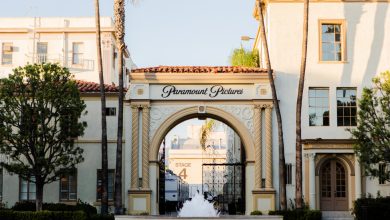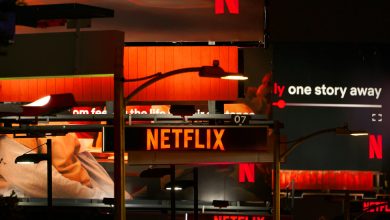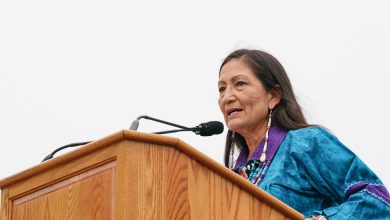Are Big Businesses In or Out of Russia?


PepsiCo and McDonald’s are among the companies rethinking their businesses in Russia.Credit…John Macdougall/Agence France-Presse — Getty Images
Shades of gray
As Western governments ratchet up their economic punishments against Russia after it invaded Ukraine, the corporate world has paused or pulled out of operations there. But as the list of companies quitting Russia grows by the day, differences in the degree of disconnection are spurring debate.
Companies that have paused operations or announced limited pullouts are coming under pressure to make a more definitive break: all or nothing, in or out. That has led some to rapidly revise their plans, raising questions about the long-term implications.
Some corporate withdrawals are partial. Procter & Gamble, for example, has “discontinued all new capital investments” in Russia. It is also “significantly reducing” its product portfolio there to focus on “basic health, hygiene and personal care items needed by the many Russian families who depend on them in their daily lives.” Danone and PepsiCo made similar moves, halting new investments and stopping sales of some products, but continuing with dairy and baby products, arguing that those products serve essential needs.
Is that enough? “The point is that we’re trying to starve the regime of their resources,” said Bill Browder, a hedge fund manager who worked in Russia and has long campaigned against corruption there. Some companies that initially said that they would remain in Russia backtracked within days, including Deutsche Bank and the retailer Uniqlo. Others, like Shell, were pushed to go further than they originally announced.
Leaving Russia makes it difficult to return. Shutting down plants, offices and supply chains is complicated. There are also concerns about expropriation and I.P. theft. P&G’s Gillette plant in St. Petersburg, for example, exports shaving products to more than 50 countries and accounts for 70 percent of the Russian shaving product market.
Some executives have argued that it’s not up to companies to lead on the punishments that Russia faces. “I don’t think businesses are supposed to decide how global trade works in the world,” David Solomon of Goldman Sachs told Time magazine. “Government sets policy and then businesses follow that policy.” (The bank said last week that it would wind down its business in Russia.)
How does this square with pledges to embrace broader stakeholder concerns? The days of companies saying that they serve only shareholders are long gone. And society’s expectations for companies have changed since Coca-Cola sold drinks in Nazi Germany and Heineken brewed beer in Rwanda during the genocide there. (Both companies said that they would suspend their operations in Russia.) Corporations also spend big to lobby for public policy that puts them at the forefront of important social and environmental issues.
The precedent set by pulling out of Russia may test corporate policies about where to draw the line for doing business in places facing geopolitical or human rights concerns; in other words, it is becoming harder for boardrooms to see things in shades of gray.
HERE’S WHAT’S HAPPENING
Oil prices show signs of stabilizing. Brent crude, the international benchmark, fell below $109 a barrel today, its lowest level since the beginning of the war in Ukraine. Traders appear to be heartened by the apparent progress in talks between Russia and Ukraine.
Banks try to contain the nickel market crisis. JPMorgan Chase and Standard Chartered were among the lenders negotiating with the Chinese metal producer Tsingshan over extending credit lines to help it meet margin requirements, The Wall Street Journal reports. The talks come as nickel trading remains suspended, after a huge short squeeze hit Tsingshan with billions in paper losses.
Foxconn shuts factories in China amid a Covid outbreak. The tech manufacturing giant said it had stopped production in Shenzhen, a major tech hub, after the local authorities ordered all residents to stay home and nonessential businesses to stop production. It’s the latest blow for Chinese tech companies, whose stocks have been tumbling.
Tencent reportedly faces big anti-money laundering fines. The Chinese internet giant may be punished for violations of “know your customer” regulations on its WePay payments network, according to The Wall Street Journal.
Tom Brady unretires. The N.F.L. quarterback said he would return to the Tampa Bay Buccaneers next season, six weeks after he announced his retirement. One question is whether Brady will restructure his contract — he’s set to be paid $25 million — to help the team sign other players under the league’s salary cap.
The latest on the Russia-Ukraine war
-
Russia asked China for economic and military aid as sanctions bite, U.S. officials said. India is reportedly weighing purchases of Russian oil at a steep discount.
-
Russia’s decision to repay some foreign creditors in rubles won’t constitute a default on its debt, according to the industry group that oversees credit-default swaps.
-
Wheat prices have whipsawed amid concerns over poor harvests and shipping blockages tied to the war, and hedge funds that have bet on rising commodity prices have enjoyed huge gains.
-
American officials imposed more sanctions on Russian oligarchs, while British regulators ordered banks to provide more information about their sources of wealth. Meanwhile, the English soccer club Chelsea F.C. is grappling with life without financial support from its owner, the sanctioned oligarch Roman Abramovich.
-
Beware: That Russian product you’re boycotting may not be Russian.
-
For up-to-the-minute news, see The Times’s live blog and updated maps.
1MDB’s ‘he said, he said’ trial
The trial in one of the largest international kleptocracy cases in history, the looting of billions of dollars from Malaysia’s 1MDB sovereign wealth fund, is in the final stretch. Roger Ng, a former banker at Goldman Sachs, is accused of assisting the scheme’s mastermind, Jho Low.
The proceedings have turned into a “he said, he said” affair, The Times’s Matt Goldstein reports, pitting Ng against another former Goldman banker, Tim Leissner, who has already pleaded guilty and who last week finished 10 days of testimony. Goldman, which made $600 million in fees to arrange bond deals for 1MDB, has also pleaded guilty on behalf of an Asian subsidiary and paid more than $5 billion in fines.
There are two more weeks scheduled in Ng’s trial. Here’s the latest:
A quick recap: Malaysia set up 1MDB in the late 2000s, with Low as an adviser. Starting in 2009, Goldman underwrote a series of bonds for the fund that raised $6.5 billion for economic development. Instead, much of the money was redirected by Low and others close to the Malaysian prime minister at the time, Najib Razak, who has since been convicted in his home country and sentenced to 12 years in jail. Low is believed to be living in China, beyond the reach of U.S. prosecutors.
What Leissner says: Goldman’s former top dealmaker in Asia said that Ng was Low’s primary contact at the bank. Leissner said that Ng set up a key meeting with Low in which Low told the bankers whom to bribe in order for Goldman to land the bond deals.
What Ng says: Ng has not testified, but his lawyers have called Leissner a liar, with ample evidence. Among other things, Leissner admits to presenting bogus divorce papers to his now-estranged wife and admitted that he “lied a lot.” Goldman also painted Leissner as a con man in its defense.
The Russia-Ukraine War and the Global Economy
Rising concerns. Russia’s invasion on Ukraine has had a ripple effect across the globe, adding to the stock market’s woes and spooking investors. The conflict has already caused dizzying spikes in energy prices, and could severely affect various countries and industries.
The cost of energy. Oil prices already were the highest since 2014, and they have continued to rise since the invasion. Russia is the third-largest producer of oil, so more price increases are inevitable.
Gas supplies. Europe gets nearly 40 percent of its natural gas from Russia, and it is likely to be walloped with higher heating bills. Natural gas reserves are running low, and European leaders worry that Moscow could cut flows in response to the region’s support of Ukraine.
Food prices. Russia is the world’s largest supplier of wheat; together, it and Ukraine account for nearly a quarter of total global exports. Countries like Egypt, which relies heavily on Russian wheat imports, are already looking for alternative suppliers.
Shortages of essential metals. The price of palladium, used in automotive exhaust systems and mobile phones, has been soaring amid fears that Russia, the world’s largest exporter of the metal, could be cut off from global markets. The price of nickel, another key Russian export, has also been rising.
Financial turmoil. Global banks are bracing for the effects of sanctions intended to restrict Russia’s access to foreign capital and limit its ability to process payments in dollars, euros and other currencies crucial for trade. Banks are also on alert for retaliatory cyberattacks by Russia.
Experts’ take: Leissner’s deceptions complicate the Ng case, but don’t kill it, said Rebecca Roiphe, a former prosecutor and a professor at New York Law School who specializes in legal ethics. A bigger problem for the government’s case, she said, could be that Leissner was Ng’s boss.
“It’s not just the doomsayers or the eco-hippies.”
— Diane Vukovic of Primal Survivor, an organization that helps consumers with disaster preparedness, on the growing number of people going off the grid. Northern California is at the vanguard of the movement.
Disclosure of corporate political donations delayed
When Congress approved a $1.5 trillion budget deal last week, it averted a government shutdown but didn’t address an issue that Democrats had vowed to fix.
Since 2015, a budget rider has prohibited the S.E.C. from requiring companies to disclose details about their political spending. This constraint was highlighted after the Jan. 6 riot in the Capitol prompted a public reckoning about corporate donations, but it remains in place. That leaves the push for transparency on corporate political spending to investors and proxy proposals.
Activists see “continued momentum” on corporate political disclosure because of employee pressure, said Bruce Freed of the Center for Political Accountability, noting Disney workers’ push for the company to oppose Florida’s “Don’t Say Gay” bill. Last year, more boards agreed to political spending resolutions, and more proxy proposals on these issues passed by vote than ever. Freed’s group is now working with 22 companies on similar resolutions. But “private ordering” of disclosure on a company-by-company basis won’t suffice, some say.
“Standardized disclosure evens the playing field,”the S.E.C. commissioner Allison Herren Lee told DealBook. While shareholder proposals help increase transparency around political spending and other environmental, social and governance (E.S.G.) issues, she said that relying on private actors resulted in “spotty disclosure and may advantage larger investors.” Standardizing what companies report “lets investors put the whole picture together, getting consistent and comparable information across the market,” she said.
Company reports would highlight contradictions between rhetoric and spending. Companies can make political donations that conflict with their public stances, which undermines their stated E.S.G. agenda and may even materially mislead investors. “Shareholders and the investing public understandably want to know whether their money is being spent to serve their interests or those of the executives who direct it,” Lee said. As acting S.E.C. chair last year, she made E.S.G. disclosures a priority. The agency’s current chair, Gary Gensler, has also called for more disclosure on political giving, but Congress has limited what he can do about it.
THE SPEED READ
Deals
-
Steve Cohen’s Point72 is reportedly planning to withdraw its remaining $750 million investment in Melvin Capital Management. (Bloomberg)
-
The creators of Bored Apes Yacht Club will buy the CryptoPunks and Meebits brands from Larva Labs, as they seek to create an NFT empire. (Bloomberg)
-
Didi Chuxing’s stock has dropped sharply amid pushback from Chinese regulators, hitting major shareholders like SoftBank and Uber. (CNBC)
Policy
-
U.S. officials said they won’t negotiate exemptions for Russian sanctions to save efforts to preserve the Iran nuclear deal. (WSJ)
-
California’s expansive, expensive and long-delayed high-speed rail line is a major test of President Biden’s infrastructure initiatives. (NYT)
-
“First Amendment Scholars Want to See the Media Lose These Cases” (NYT)
Best of the rest
-
Facebook’s parent company, Meta, has cut back on some corporate perks, like free laundry services, as it prepares for a future of hybrid work. (NYT)
-
A look the rise and fall of the Saudi-funded challenger to the P.G.A. (WSJ)
-
An expansive profile of Ramesh Balwani, the former president of Theranos, notes that federal prosecutors are closely examining the 2018 sale of the house he shared with Elizabeth Holmes. (The Information)
-
An ice-cream tech start-up is waging legal war on McDonald’s. (NYT)
We’d like your feedback! Please email thoughts and suggestions to [email protected].




